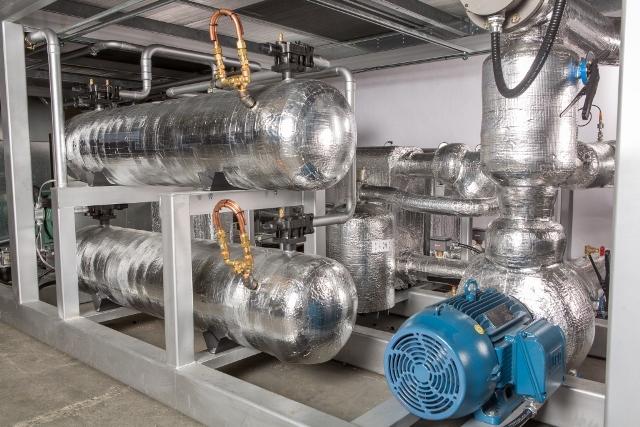Press release
Density & Viscosity Monitoring of Coolant in Stream
Coolant is a medium used to absorb or transfer heat and maintain system temperature stability, widely applied in industrial cooling, automotive radiators, air conditioning refrigeration, and electronic device cooling.In fluid cooling systems, the viscosity and density of the coolant are key parameters reflecting its physical state, purity, and system operational efficiency. Real-time monitoring of these parameters is crucial for maintaining optimal performance and longevity of high-density processors and critical components.
Types of Common Industrial Coolant
Common coolant is categorized into water-based coolant, organic coolant, low-temperature coolant and the like based on their functions and chemical components. Glycol is a kind of organic coolant commonly used in cooling systems, which combine glycols with water and additives like corrosion inhibitors, are widely used due to their excellent heat transfer and freeze protection properties.
However, maintaining coolant performance requires vigilant monitoring of viscosity, concentration, and degradation. In general, coolant degrades with concentration shifts and deposit formation while compromise system reliability.
Image: https://www.lonnmeter.com/uploads/glycol-cooling-system.jpg
Glycol-based Cooling Systems
Glycol-based cooling systems are the backbone of thermal management in data centers, industrial processes, and HVAC systems. These systems typically use propylene or ethylene glycol mixed with water to achieve a balance of heat transfer efficiency, freeze protection, and corrosion resistance. Additives, such as corrosion and degradation inhibitors, are included to protect piping and electronic components from damage. The performance of these systems hinges on maintaining optimal glycol concentration and detecting degradation early to prevent issues like corrosion, reduced heat transfer, or coolant deposits.
Key Properties to Monitor
* Glycol Concentration: Determines the coolant's ability to transfer heat and protect against freezing and corrosion. Too high a concentration reduces heat transfer efficiency, while too low increases the risk of freezing or corrosion.
* Viscosity: A critical indicator of glycol concentration, as viscosity varies significantly with the glycol-water ratio and temperature.
* Degradation: Over time, glycols can break down into acidic compounds, leading to corrosion or the formation of deposits such as biofilms or corrosion products.
* Coolant Deposits: Contaminants, biofilms, or corrosion byproducts can accumulate in the system, reducing flow efficiency and accelerating component wear.
Challenges in Density and Viscosity MonitoringofGlycol-based Cooling Systems
Maintaining the reliability of glycol-based cooling systems is fraught with challenges, particularly in high-stakes environments like data centers where downtime is costly. Below are the primary hurdles:
* Concentration Fluctuations: Changes in glycol concentration can occur due to water evaporation, leaks, or improper maintenance. These shifts disrupt the balance between heat transfer and freeze/corrosion protection, potentially leading to system inefficiencies or failures.
* Coolant Degradation Over Time: Absolutely. Glycol-based coolants can degrade due to thermal stress, oxidation, or microbial activity, producing acidic byproducts that corrode metal components and form deposits. This degradation is often gradual and difficult to detect without continuous monitoring.
* Deposit Formation: Coolant deposits from corrosion products, biofilms, or contaminants can clog pipes and then reduce flow rates and heat transfer. These deposits are particularly problematic in data centers, where precision cooling is critical.
* Inconsistent Monitoring: Traditional monitoring methods, such as periodic lab analysis, are labor-intensive and provide delayed results, making it challenging to address issues in real-time. Electrochemical sensors (e.g., pH or conductivity) often require frequent recalibration and are susceptible to degradation themselves.
* Temperature Variability: Coolant viscosity is highly temperature-dependent, complicating concentration measurements without accurate temperature compensation.
* Integration Complexity: Integrating monitoring solutions into existing systems can be challenging, especially when dealing with diverse industrial protocols or legacy infrastructure.
These challenges underscore the need for robust, real-time monitoring solutions like inline coolant viscometers to ensure system reliability and longevity.
LonnmeterInlineViscometers-- A Game-Changing Solution
Lonnmeter, a leader in industrial sensor technology, offers the inline viscometer, a robust and compact solution designed specifically for coolant viscosity monitoring in glycol-based cooling systems. The sensor stands out for its ability to monitor viscosity, temperature, and coolant deposits, providing a comprehensive picture of coolant health.
Key Features of the Lonnmeter
High-Precision Viscosity Measurement:
* Lonnmeter viscometers feature wide viscosity range from 1 - 1,000,000 cP with plus-minus 3% accuracy and plus-minus 1% repeatability. Customers are allowed to customize pressure range above 10 MPa if needed.
* Built-in temperature compensation ensures accurate measurements despite temperature fluctuations, a critical feature for data center environments.
Long-Term Stability:
* With a factory calibration that remains valid for over 15 years, the inline process viscometer eliminates the need for recalibration, unlike electrochemical sensors that require frequent maintenance.
Continuous Monitoring:
* Unlike lab analysis, which provides delayed results, the inline process viscometer offers real-time data, enabling proactive maintenance and reducing downtime.
Integration Flexibility:
* The inline process viscometer supports multiple industrial protocols (e.g., 4-20 mA, Modbus, HART), ensuring seamless integration into existing control systems.
* Lonnmeter's Integration Team provides support for communication settings and remote configuration.
* In addition to all above features, ODM services are available to all customers in the event that standard automation sensors fall to meet your individual demands.
* Real-Time Insights: The inline process viscometer's continuous measurements eliminate the delays associated with lab analysis.
* Maintenance-Free Operation: Simple mechanical structure ensures long-term lifespan and reduce maintenance costs.
* Integratable with PLC/DCSsystem: Adjust process lines based on historic data acquisition and analysis.
* Comprehensive Monitoring: Provide viscosity and temperature readings at the same time.
* Cost Efficiency: Reduced maintenance and downtime translate to significant cost savings for data center operators.
Advantages Over Traditional Methods
Effective monitoring of viscosity, concentration, and degradation in fluid cooling systems is essential for the reliability of data centers and other critical applications. Lonnmeter inline coolant viscometer addresses the challenges in glycol-based cooling systems by delivering real-time, high-precision measurements of viscosity, temperature, and coolant deposits. Contact engineers for more professional suggestions.
Media Contact
Company Name: SHENZHEN LONNMETER GROUP
Email:Send Email [https://www.abnewswire.com/email_contact_us.php?pr=density-viscosity-monitoring-of-coolant-in-stream]
Country: China
Website: https://www.lonnmeter.com/
Legal Disclaimer: Information contained on this page is provided by an independent third-party content provider. ABNewswire makes no warranties or responsibility or liability for the accuracy, content, images, videos, licenses, completeness, legality, or reliability of the information contained in this article. If you are affiliated with this article or have any complaints or copyright issues related to this article and would like it to be removed, please contact retract@swscontact.com
This release was published on openPR.
Permanent link to this press release:
Copy
Please set a link in the press area of your homepage to this press release on openPR. openPR disclaims liability for any content contained in this release.
You can edit or delete your press release Density & Viscosity Monitoring of Coolant in Stream here
News-ID: 4132181 • Views: …
More Releases from ABNewswire

CopperJoint x Paulina Jayne: The Official Launch of the Pink Sock Collection, Ce …
CopperJoint proudly announces the nationwide release of its new Pink Sock Collection, a movement-inspired collaboration with Nashville singer-songwriter Paulina Jayne. Combining expressive style with meaningful daily motivation, the long pink compression socks feature two signature woven message bands - "KEEP GOING" and "JOY IN MOTION." This collection marks an exciting moment for women that not only looks good, but also lifts the spirit.
An Inspired Partnership with Purpose
The collaboration began with…

TCL Offers Unmatched Discounts on NXTPAPER 11 Gen 2 Tablets for a Limited Time
Image: https://www.abnewswire.com/upload/2025/11/7d28d258c990d6d6d333a09d1195a4d9.jpg
TCL is making eye comfort more affordable than ever this Black Friday, with both configurations of its NXTPAPER 11 Gen 2 tablet [https://www.amazon.com/dp/B0FG7FRDPL?maas=maas_adg_F465400792B3CDBEB55FE9291F5841A8_afap_abs&ref_=aa_maas&tag=maas] seeing record-low prices on Amazon. From now through December 1, the 64 GB version is down to $159.99 (36% off), and the 128 GB version is just $179.99 (38% off).
The NXTPAPER 11 Gen 2 stands out for its paper-like 11-inch Full HD+ display, powered by TCL's…

TCL offers exceptional deal making NXTPAPER 11 Plus tablet affordable under 300$
If you're looking for a tablet that balances performance, comfort, and value, the NXTPAPER 11 Plus from TCL [https://www.amazon.com/dp/B0FLJMFNR7?maas=maas_adg_5AF2681E26EC62C74DF5C1C72CE6A9DD_afap_abs&ref_=aa_maas&tag=maas] is shaping up to be one of this year's smartest buys. With the Black Friday sale underway, you can snag it for just $249.99.
Image: https://www.abnewswire.com/upload/2025/11/da5f5868666d07b1b589c9593af7a59f.jpg
The 11.5" 2.2K resolution screen uses TCL's proprietary NXTPAPER 4.0 technology, designed to reduce glare, cut blue-light emission, and deliver a more "paper-like" reading experience - ideal…

TCL Unveils Exceptional Offer on the Advanced NXTPAPER 11 Gen 2 Tablet
If you're on the lookout for an affordable tablet this Black Friday that's easy on the eyes, the TCL NXTPAPER 11 Gen 2 (128 GB) [https://www.amazon.com/dp/B0FG7QV6SF?maas=maas_adg_1486FCD4C758EA9A35182092D196F846_afap_abs&ref_=aa_maas&tag=maas] is now a serious contender - and with its current deal, it's one to watch.
Image: https://www.abnewswire.com/upload/2025/11/1c870dfdbb5765161f68d40f15583e4c.jpg
Original price: $289.99
Black Friday price: $179.99 - that's 38% off (about $110 off)
Deal runs from November 20 through December 1, 2025, available on Amazon.
Eye-friendly NXTPAPER display: The NXTPAPER 4.0…
More Releases for Coolant
Mining Coolant Market Unveiling Growth, Challenges & Trends 2030 | ExxonMobil, T …
Mining Coolant Market Overview -
According to QYResearch New Study Report 'Mining Coolant Market 2024' provides a comprehensive analysis of the industry with market insights will definitely facilitate to increase the knowledge and decision-making skills of the business, thus providing an immense opportunity for growth. Finally, this will increase the return rate and strengthen the competitive advantage within. Since it's a personalised market report, the services are catered to the particular…
Antifreeze/Coolant Market Size and Forecast
𝐔𝐒𝐀, 𝐍𝐞𝐰 𝐉𝐞𝐫𝐬𝐞𝐲- The global Antifreeze/Coolant Market is expected to record a CAGR of XX.X% from 2024 to 2031 In 2024, the market size is projected to reach a valuation of USD XX.X Billion. By 2031 the valuation is anticipated to reach USD XX.X Billion.
The impact of manufacturers on the market is significant across various industries, influencing supply chains, consumer choices, and economic growth. Manufacturers are key players in the…
Antifreeze/Coolant Market Size and Growth
𝐔𝐒𝐀, 𝐍𝐞𝐰 𝐉𝐞𝐫𝐬𝐞𝐲- The global Antifreeze/Coolant Market is expected to record a CAGR of XX.X% from 2024 to 2031 In 2024, the market size is projected to reach a valuation of USD XX.X Billion. By 2031 the valuation is anticipated to reach USD XX.X Billion.
The Antifreeze/Coolant market is expected to witness significant growth over the forecast period due to its vital role in maintaining the optimal performance of internal combustion…
Automotive Coolant Control Valves Market Controlling Automotive Coolant Flow 202 …
The Report on "Automotive Coolant Control Valves Market" provides Key Benefits, Market Overview, Regional Analysis, Market Segmentation, Future Trends Upto 2030 by Infinitybusinessinsights.com. The report will assist reader with better understanding and decision making.
Market Growth of Automotive Coolant Control Valves Market: The Automotive Coolant Control Valves market is experiencing robust growth as the automotive industry undergoes a paradigm shift towards electrification and sustainable thermal management. Market expansion is driven by…
Driving Industrial Coolant: Exploring the Dynamics of Coolant Pump Technologies
The coolant pumps market plays a critical role in various industries, ensuring optimal thermal management and efficient heat dissipation in mechanical systems. These pumps are integral components, facilitating the circulation of coolant to maintain the temperature within permissible limits, preventing equipment overheating and ensuring operational longevity. As industries continue to prioritize performance and reliability, the coolant pumps market has become a key enabler of sustainable and efficient thermal control solutions.
The…
Antifreeze (Coolant) Disposal Service Market Proper and Environmentally-Friendly …
Global Antifreeze (Coolant) Disposal Service Market Overview:
The Antifreeze (Coolant) Disposal Service market is a broad category that includes a wide range of products and services related to various industries. This market comprises companies that operate in areas such as consumer goods, technology, healthcare, and finance, among others.
In recent years, the Antifreeze (Coolant) Disposal Service market has experienced significant growth, driven by factors such as increasing consumer demand, technological advancements, and…
